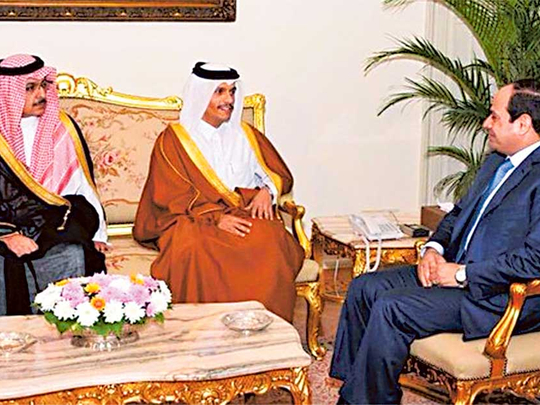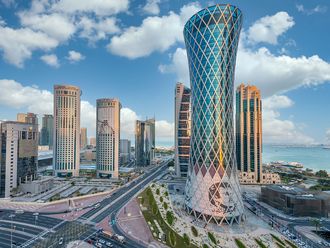
Cairo: Egypt is looking forward to a new era with unity among Arab countries and an end to past disagreements as a priority, and will work on a common vision to achieve the aspirations of Arab people, President Abdul Fattah Al Sissi said yesterday.
The comments came after Al Sissi met for the first time a special envoy of the Emir of Qatar, the latest step in a Saudi-brokered effort to repair relations, regional news agencies reported. At the meeting – convened by a special envoy of the Saudi King – Al Sissi discussed ways of advancing Saudi King Abdullah’s initiative put forward at the GCC Summit in Riyadh, with a focus on bolstering reconciliation among Egypt and Qatar.
Ties between Cairo and Doha deteriorated after then-army chief Al Sissi removed President Mohammad Mursi and his Muslim Brotherhood from power in July 2013 following mass protests against his rule. King Abdullah last month called on Egypt to back a deal under which Saudi Arabia, the UAE and Bahrain agreed to end an eight-month diplomatic dispute over Qatar’s support for the Brotherhood and promotion of “Arab Spring” revolts. That agreement, arrived at the Riyadh summit, was the main point of discussion between Al Sissi and Shaikh Mohammad Bin Abdul Rahman Al Thani of Qatar at Saturday’s meeting in Cairo, also attended by Khaled Bin Abdul Aziz Al Tweijri, Chairman of the Saudi Royal Court and the Saudi King’s special envoy.
“The two countries responded to [King Abdullah’s initiative] with full conviction,” said a report from the Saudi news agency SPA. According to a statement from the Egyptian presidency, the meeting also tackled the decisions made in the Riyadh summit and commitments by all GCC countries to support Egypt and contribute to its security and stability.
The UAE warmly welcomed King Abdullah’s successful initiative to heal the rift between Qatar and Egypt and help both countries turn a new page in bilateral relations and cooperation.
“The initiative by King Abdullah Bin Abdul Aziz will have a significant positive impact in promoting solidarity among all Arab countries, and marks the beginning of a blessed new phase of joint Arab action that will consolidate the bonds of brotherhood and cooperation between them so they can stand in the face of challenges,” Shaikh Abdullah Bin Zayed Al Nahyan, UAE Foreign Minister, said in a statement. He also underscored the UAE’s appreciation of the efforts made by King Abdullah and the positive response of Shaikh Tamim Bin Hamad Al Thani, Emir of Qatar, and Al Sissi, to these efforts.
Like Saudi Arabia, the UAE and Bahrain, Egypt also withdrew its ambassador to Qatar in spring this year. The Gulf states returned their ambassadors to Doha in time for the summit earlier this month. But while the others have agreed to normalise diplomatic relations under the November deal, Cairo has yet to follow suit.
Egypt, the UAE and Saudi Arabia all list the Brotherhood as a terrorist organisation. Qatar is seen to have been supportive of the Muslim Brotherhood in Egypt and the UAE, and more recently Libya. It had given sanctuary to some Brotherhood members but in September asked seven senior figures from the group to leave, following months of pressure from its Gulf neighbours.
Riyadh and Abu Dhabi also see the Doha-based Al Jazeera news network as being a Brotherhood mouthpiece, which Qatar denies. Al Sissi suggested last month he was considering pardoning Al Jazeera journalists currently serving a seven-year jail term on charges of aiding a “terrorist organisation” by spreading lies.












